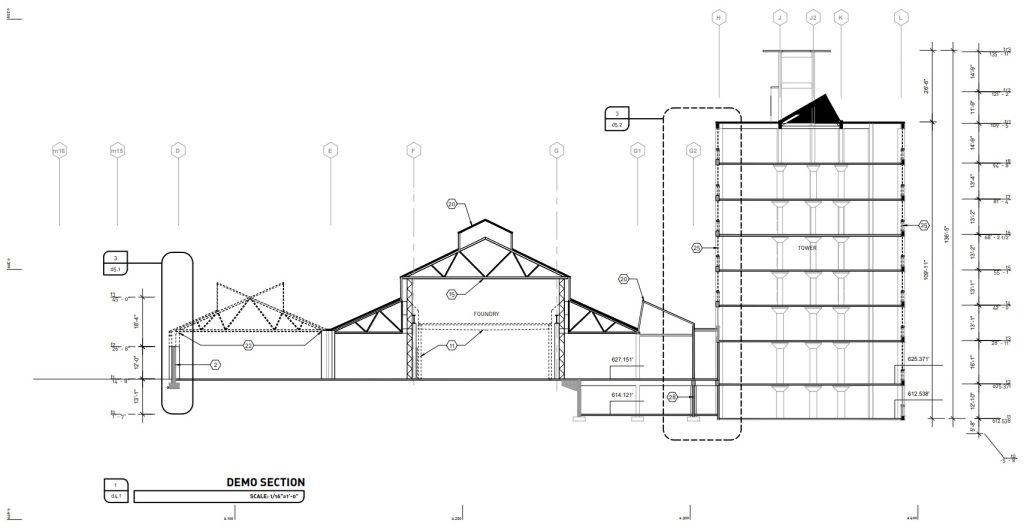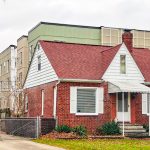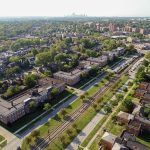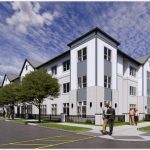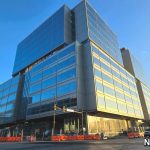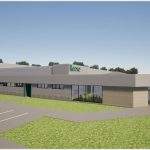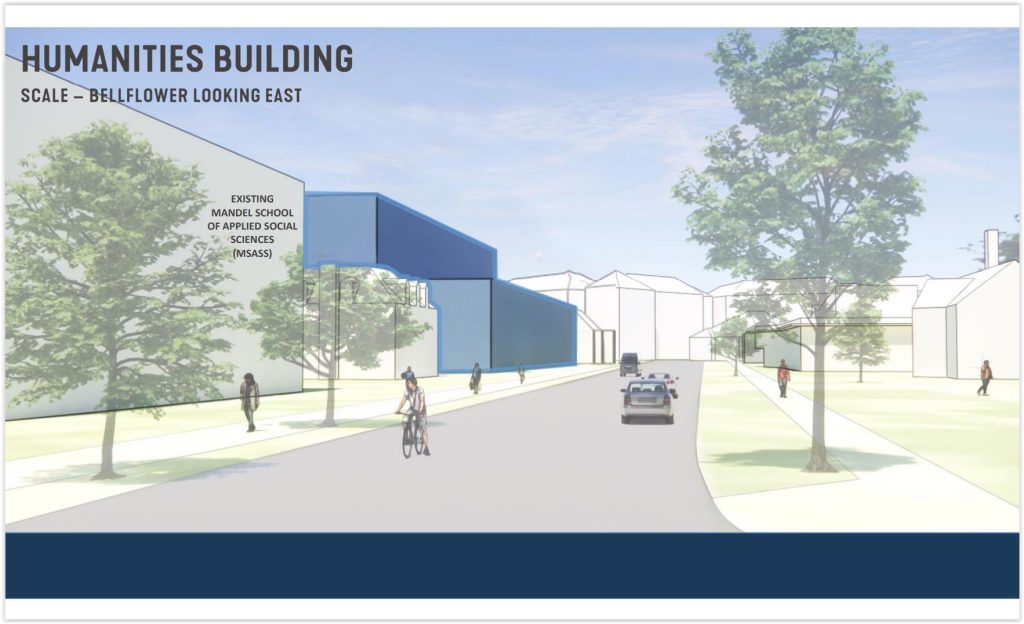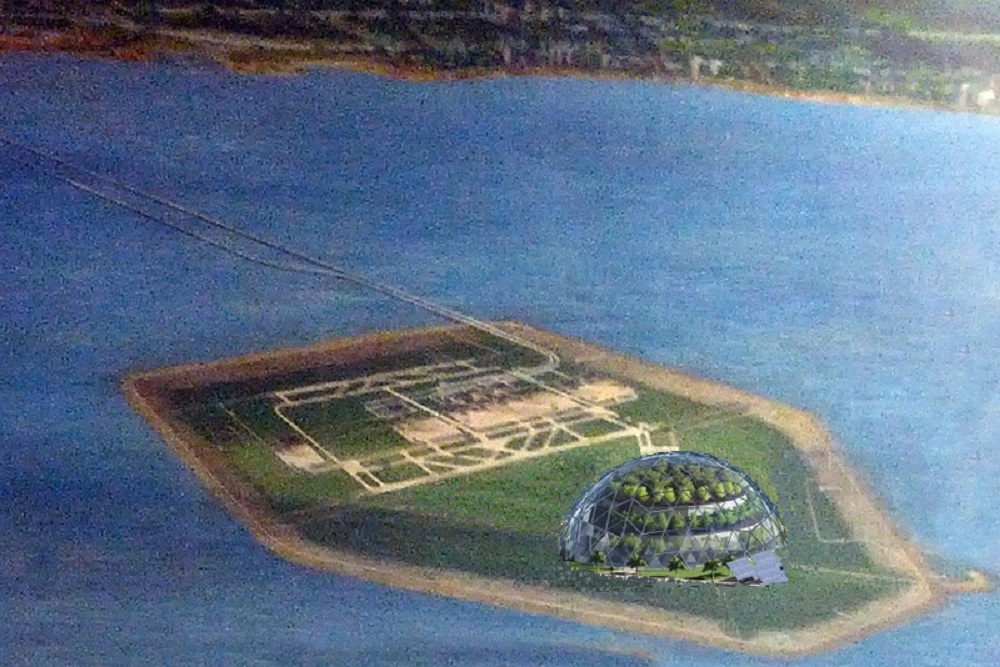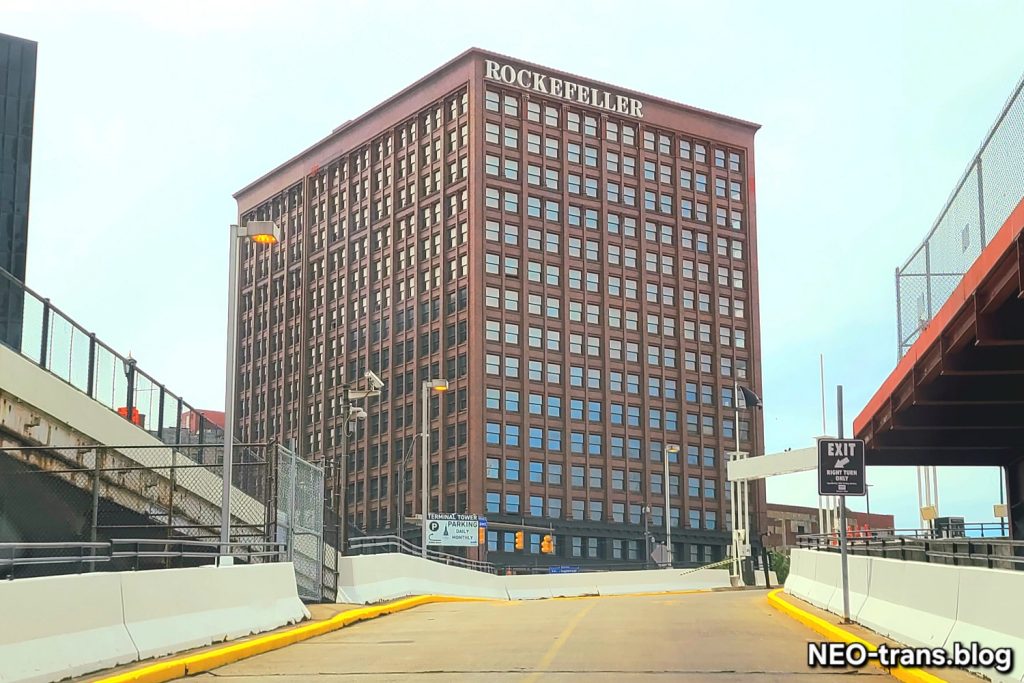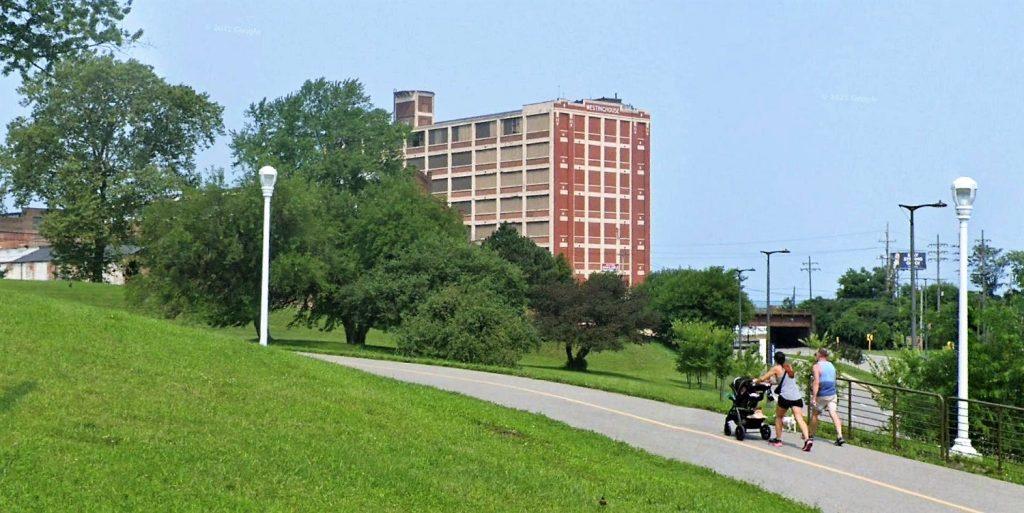
Looking north from Cass Avenue and the Cleveland Lakefront Bikeway, the tower of the former Westinghouse plant stands out. It will be saved and redeveloped, offering residents and guests unobstructed views of Lake Erie, downtown and the north end of the Gordon Square neighborhood (Google). CLICK IMAGES TO ENLARGE THEM.
Demo plans reveal what will be redeveloped
Planning documents submitted to the city yesterday reveal that slightly more than half of the former Westinghouse plant overlooking the West Shoreway and Lake Erie could be demolished in preparation for the redevelopment of the surviving structures. According to sources familiar with the project, the surviving portions at the plant at 1200 W. 58th St. in Cleveland are proposed to be redeveloped as a boutique hotel, apartments and leasable commercial spaces plus parking.
While the familiar eight-story brick structure built in 1915 that towers over the Shoreway near Edgewater Park will remain intact so it can be redeveloped, most of the rest of the plant will not. Also to be retained in its entirety is a small brick building at the southwest corner of the former industrial property called the watertower building in the planning documents. The plans were submitted to the city as part of a request for a demolition permit.
But a 19th-century foundry building measuring 62,844 square feet will keep only about one-third of its structure, or 21,580 square feet, that’s closest to West 58th. The watertower building’s roughly 8,000 square feet of floor space appears to be included in the foundry’s tally. Lastly, a 102,000-square-foot, low-rise manufacturing and warehouse facility is to be flattened entirely. In total, 143,238 square feet of the 281,800-square-foot ex-Westinghouse complex would be demolished.
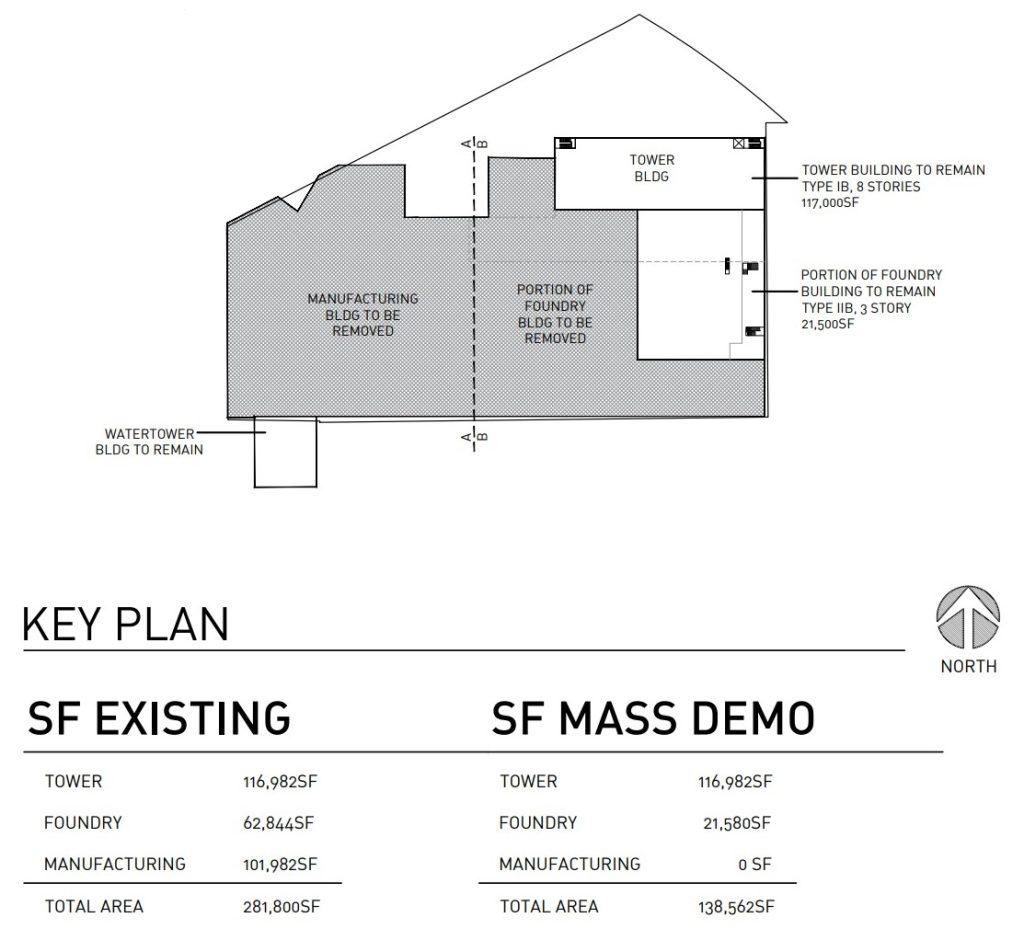
This is a summary of which structures will be demolished and which ones will be kept. The floor space in each of three basic structures is shown before demolition at left and after demolition at right. Mass demolition refers to the removal of entire structures and differs from interior demolitions in which interior walls, floors, equipment, fixtures, ducts and conduits are removed (AoDK).
The demolitions could open up as much as 2.8 acres of land for parking and/or additional development. At roughly 240 parking spaces per acre, the demolitions could avail enough room for surface parking lots totaling about 670 spaces. That also counts using land on the north side of the tower for parking. The demolition plans show that two temporary construction sediment basins about 5 feet deep each will be dug between the north side of the tower and the busy Norfolk Southern railroad tracks and the Shoreway.
Plans also show that the southernmost wall of the low-rise manufacturing structure is proposed to be saved. This brick wall will serve as a divider from one of the buildings and parking lots for The Edison at Gordon Square apartments, built in 2017. Construction of 5900 Father Caruso Dr., the easternmost building of The Edison, required the demolition of a portion of the Westinghouse plant in 2015.
The factory had previously been owned by the Kole family since 1986 and used for their Paramount Stamping, Welding & Wireforming Co. since 1981, county property records show. Paramount manufactured steel automobile seat frames and employed 300 people, then closed in 2019.
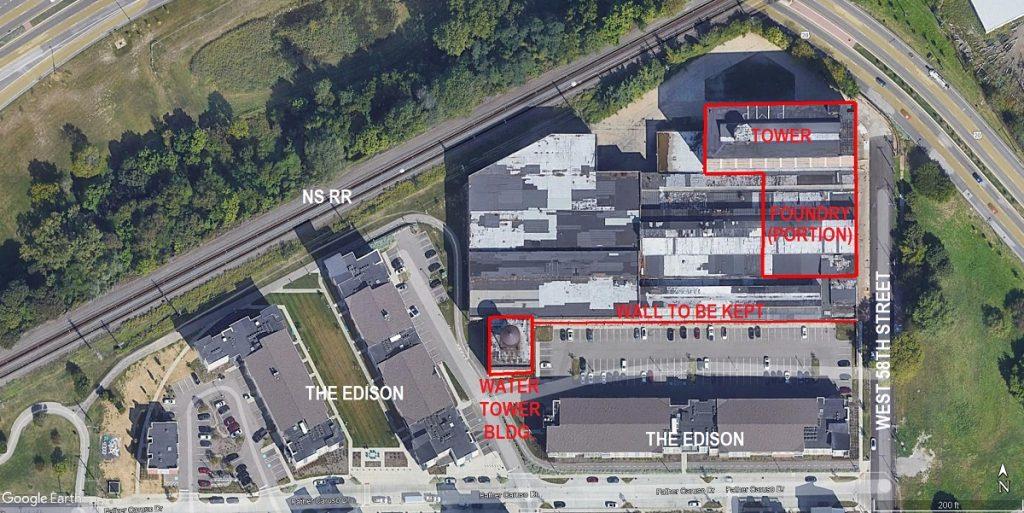
The prior graphic has no site context so this image shows which buildings, outlined with thicker red lines, will be retained. It also shows a skinny red line showing a factory wall that will be kept to separate the redeveloped former Westinghouse plant to the north with part of The Edison at Gordon Square apartments to the south (Google).
The Westinghouse Lighting Division ceased operations at the plant in 1979 after nearly 100 years. Westinghouse relocated its operations nearby to a much smaller building at 5901 Breakwater Ave. for just two more years. Some of the structures on the original site north of Breakwater date to 1882. It is peak, the Westinghouse plant covered 13 acres and employed more than 500 people, according to the Encyclopedia of Cleveland History.
The current property owner and leading member of the development team is an affiliate of Trebilco LLC of Cleveland which is managed by Michael Trebilcock, Jr. His father founded Cleveland-based MCPc, a fast-growing information technology company that helps businesses manage security risks and logistical challenges. The development team also includes The Krill Co. of Cleveland as the general contractor and AoDK Architecture Inc. of Lakewood as the project’s architect.
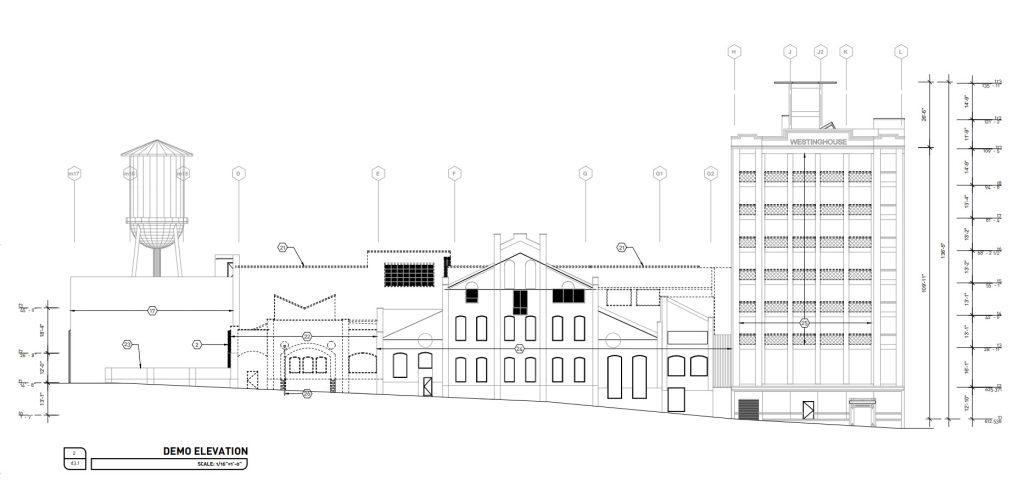
Structures to be removed are outlined with dashed lines in this image which looks west at West 58th Street frontage of the former Westinghouse plant. At right, or north, is the eight-story tower with the foundry in the middle of this view. The structure immediately to the left of the foundry will be razed as will the western two-thirds of the foundry. The watertower building in the background at far left will be kept (AoDK).
Demolition costs are estimated at $1.3 million, according to the documents that were submitted to the city’s Building and Housing Department. The work will be funded by a $2.6 million grant awarded in April by the Ohio Department of Development to Trebilco affiliate Westinghouse-Breakwater Properties for “The abatement of hazardous materials and demolition of hazardous sites,” a written statement from Gov. Mike DeWine’s office said. “The site, most recently home to Paramount Stamping and Welding, is expected to be redeveloped into a mixed-use development space.”
A former Westinghouse employee who worked at the plant but asked to not be named said the property will require significant expenditures for environmental clean up. During the decades that Westinghouse owned the plant, its structures were full of heavy machinery such as drop forges, foundries and presses as well as polishing, annealing and anodizing processes, the former employee said.
The demolition permit application, dated Sept. 16, says that site preparation work could begin as early as this month with construction of the mixed-use development concluding in December 2024. However, the application makes no mention of the proposed uses and activities that Trebilco envisions for inclusion in this development. E-mails by NEOtrans seeking comment and sent to Trebilcock and to Adam Stalder, executive director of the Northwest Neighborhoods community development corporation, were opened but not responded to prior to publication of this article.
Sources familiar with the project said the finished development will contain a luxury boutique hotel and market-rate apartments, plus a fine-dining restaurant and potentially one or more retail spaces, possibly involving an investment of $85 million or more. The sources said the eight-story, 136-foot-tall tower will be comprised primarily of hotel rooms and apartments with the retail/restaurants in the surviving foundry and watertower structures. AoDK’s planning documents note that the zoning for the site allows for a 160-foot-tall structure that could accommodate 12-story building.
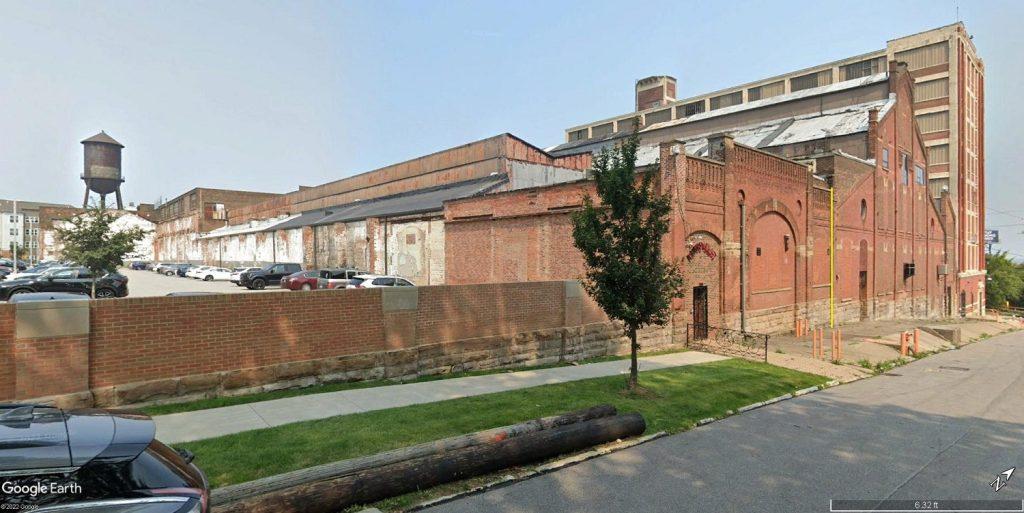
Looking generally north along West 58th Street, the buildings beyond the yellow line will be kept in part (foundry) or in whole (tower). The part of the former Westinghouse plant closer than the yellow line will be demolished for a construction driveway, plans show. The watertower building at far left will be kept as will the wall between the existing parking lot and the redevelopment site (Google).
In early June, NEOtrans reported that Trebilco had made a lot of progress on developing the project. “We’re making excellent progress but no details are public at this time,” Trebilcock said in June. “(I’m) happy to provide complete and accurate information once we are ready.” When he was asked about the timing of a public announcement regarding the project’s details, he responded only with “Soon.”
Trebilco acquired the former Westinghouse plant and its 3.6 acres of land in October 2021 after securing a purchase agreement one year earlier. The purchase price wasn’t disclosed in the deed transfer but the property, including land and buildings, was appraised last year by the county for tax purposes at $1.298 million, public records show. It was listed as available for sale for nearly three years with an asking price of $6 million.
END

